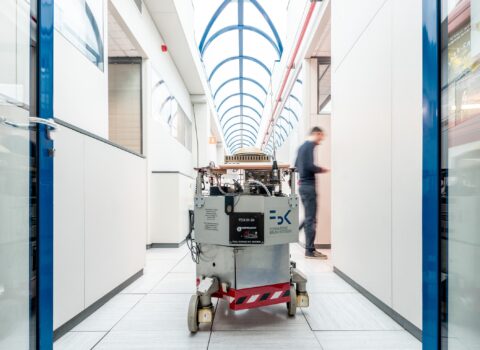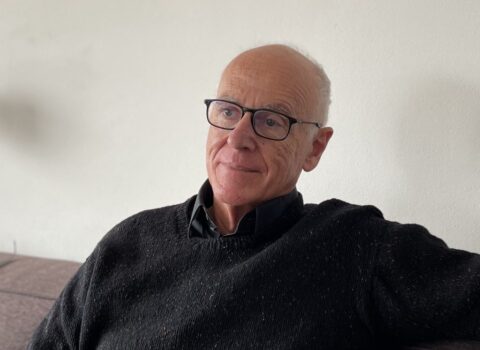Oliviero Stock

Oliviero Stock, nato a Trieste nel 1950, si è sempre occupato di ricerca in intelligenza artificiale, in particolare di comprensione del linguaggio umano e interfacce intelligenti persona-computer. È stato direttore dell’IRST, uno dei principali istituti europei di ricerca nel settore (ora Fondazione Bruno Kessler), presidente dell’Associazione Italiana per l’Intelligenza Artificiale, della European Association for Artificial Intelligence e dell’Association for Computational Linguistics. Nel 2019 ha ricevuto un dottorato honoris causa dall’Università di Haifa. È autore di numerosi articoli e volumi scientifici.
Education
Laurea in Mathematics, Univ. of Firenze. Post lauream Specialisation in Computer Science, Univ. of Pisa, 1976, with a thesis on natural language parsing
Professional experience
1981-1987 Tenured researcher with the Italian National Council for Research, Rome, where he was also coordinator of the National Strategic Project on Artificial Intelligence
1987- at FBK-IRST, Trento
1988- Founder and head of the Natural Language Processing group
1993-2002 Founder and head of the Communication and Cognitive Tech. Division
1997-2001 IRST Director
FBK-irst (previously IRST) is a research institute active in fundamental and applied research. At the time of OS’s directorship, it was structured in five Divisions: Cognitive Technologies and Communication, Interactive Sensory Systems, Automated Reasoning, Microsystems, and Physical-Chemical Properties of Surfaces. Human resources included about one hundred scientists, twenty technicians; additionally, about fifty young researchers were collaborating on specific projects
Played a key role in the launch of several IRST projects funded by European research programs. Under his tenure as director, 26 projects and contracts in the 5th European Framework Programme with IRST participation were accepted, out of 55 proposals.
2003-2011 Director of an Italian–Israeli project on AI and intelligent technologies for cultural heritage appreciation, co-coordinator of a collaboration project between the University of Haifa and FBK-irst
2010 One of the founders of the Trento Node in EIT (European Institute of Technology) Digital
2012- 2017 Director of the PerTe project, devoted to intelligent persuasion technologies: natural language, small groups, narrative negotiation, and ethical issues
Currently FBK-irst Senior Fellow
Research
All research activity in artificial intelligence: natural language processing, intelligent user interfaces, cognitive technologies, IT for cultural heritage appreciation, intelligent persuasion technology
Author of two hundred and sixty published scientific papers – over one hundred in refereed journals and books (eighty-seven international) and the rest in refereed conference and workshop proceedings (over one hundred and thirty international) – and author or editor of twelve volumes (nine international). Includes seven IJCAI papers, spanning a period of twenty-six years, 1989-2015
Fellowships and main Honors
ECCAI (European Coordinating Committee for Artificial Intelligence) Fellow, elected in the first series of ECCAI Fellows – 1999, “in recognition for pioneering work in the field of Artificial Intelligence and outstanding service for the European Artificial Intelligence community”
AAAI (American Association for Artificial Intelligence) Fellow, now Association for the Advancement of AI, since 2006, “in recognition of his wide-ranging, significant contributions to research in computational linguistics and intelligent interfaces, serious work on computational humor, and dedicated service and leadership in support of the European AI community”
DFKI (the German Research Institute for Artificial Intelligence) Fellow (2019)
Aquila di San Venceslao (2018), the most important recognition by the Autonomous Province of Trento
Doctorate honoris causa from the University of Haifa (2019)
Service to the AI Community
President of AI*IA, the Associazione Italiana per l’Intelligenza Artificiale (1992-1993 and 1994-1995)
Chairman of ECCAI, the European Coordinating Committee for Artificial Intelligence (1992-1994)
President of ACL, the Association for Computational Linguistics (1996)
Member of the editorial board of a dozen scientific journals, including Computational Linguistics, Artificial Intelligence(previously), and(associate editor of) Applied Artificial Intelligence and of the ACM Transactions on Interactive Intelligent Systems. Editor in Chief of Intelligenza Artificiale, IOS Press (2011-2015). Advisory Board member of the Book Series on Cognitive Technologies, Springer, Editorial Board Member of AAAI Press, established by AAAI and MIT Press
Chair of nineteen conferences or workshops, including: Co-chair of the PC of ANLP-92, Third Applied Natural Language Processing Conference of the Association for Computational Linguistics and General Chair of AH-2000, general co-chair ofIUI-2014. Member of the Advisory Committee of IJCAI-95, Montreal 1995, and of over one hundred and forty Program Committees of international conferences and workshops
Member of the Executive Steering Board of EIT Digital, the Knowledge Centre for ICT of the European Institute for Innovation and Technology (2012-)
Member of the Scientific Advisory Board of DFKI, the German Research Institute for AI, (2004-), of CATCH, the Technology for Cultural Heritage program of the Dutch NWO, (2007-) and, formerly, of the National Council for Research Institute LADSEB (Padova). Member of the Board of Governors of the University of Haifa (2006-)
Member of the Committee for the Best European Artificial Intelligence Dissertation Award established by ECCAI (2008, 2009, 2010, 2011, 2012, 2013, 2014, 2015)
National representative for the 7th Framework Programme (2007-2010), ICT, appointed by the Italian Ministry for University and Research. Consultant for the EU for the definition of programs in the 5th and 6th Framework Programmes
Teaching
Lecturer at several universities (Roma La Sapienza, Pavia, Pisa, Siena, Sissa Trieste, Trento) and international schools (Wilem Mathesius Courses, Charles University, Praha). Former member of the Executive Board of the International Graduate School on ICT, University of Trento. Thesis advisor for numerous students. Visiting Professor at the University of Haifa
Research directions
Oliviero Stock has developed his activity with a specific view of artificial intelligence. His goal has been to contribute to the development of a vision of computational technology that helps humans, both directly and indirectly, to improve the quality of their lives: the computational system has to make an effort to understand humans rather than the other way round. Starting from a background in mathematics and computer science he has taken an interdisciplinary approach, studying in particular linguistics, cognitive science, and other humanities areas. With this view his research can be divided in four main themes.
A first theme, followed mainly from his specialization thesis (1976) to the beginning of the Nineties, in which he worked mainly on strict natural language processing issues. He developed the first ATN parser for Italian, with a good coverage of the language, then worked on an original, lexically-based view of chart parsing. He then introduced the concept of bidirectional chart parsing, preserving the positive complexity characteristics of charts, but adding substantial flexibility to the algorithm.
A second theme, from the end of the Eighties on, was multimodal natural language processing. The idea was to develop a full paradigm of language based interaction, including syntactic, semantic, and pragmatic processing integrated with visual aspects and direct manipulation. For access to information processing, the concept was also to integrate goal-oriented behavior, typical of language, with navigational modality. It was a concept well ahead of its time, as these issues have become popular nowadays with the web. Important in this context was also work on natural language generation, essential for providing personalized answers to the user. All this was made possible by working with a substantial team that he could recruit at IRST in Trento. The realization of the system AlFresco was the main context of development in this connection.
A third theme, with an applied orientation, linked to the above theme, started in the Nineties. The idea was that cultural heritage is potentially the greatest resource of Italy and other Mediterranean countries. It needs the support of technology and at the same time it is a privileged field for exploring advanced intelligent user interfaces. With this in mind the focus of his research went into mobile adaptive guides, with many innovative aspects, including presentation adaptation based on user modeling, automated cinematography, and visit report generation. More recently the emphasis was placed on visitors coming in a small group, with original aspects such as dramatic coordinated mobile presentations with feedback derived by sensors’ data about visitors behavior, and a technological table designed for influencing group behavior at the museum café after the visit, so that they could discuss the cultural experience. The most complex realizations were conducted in the PEACH project and in a collaborative project with the University of Haifa, including a realization at the Hecht archaeological museum.
The fourth theme started around 2000, and is concerned with novel aspects of interfaces. The idea is to get away from interfaces for operating machinery or interfaces for service, but instead conceive of a proactive role for them, such as influencing people’s attitude, mood, and behavior. Basically this theme of research focuses on flexible persuasion technology, including: a) language based persuasion and automated creative production of some simple forms of wit and irony; and b) group oriented persuasion (like the café table setting and the mobile drama referred to above) and also investigation of the very important ethical issues involved in automated persuasion. The first European project ever on humor (HAHAcronym) was indicative of this effort, and the PerTe project has recently yielded results in several different areas such as language persuasion and defense from inappropriate persuasion, small group-oriented persuasion, interfaces for favoring sharing narratives in a situation of conflict, and explored computational ethics of persuasion.
Pubblicazioni
- Fachter, Shani; Schiavo, Gianluca; Snider, Keren LG.; Cappelletti, Alessandro; Stock, Oliviero; Weiss, Patrice L.; Zancanaro, Massimo; Canetti, Daphna; Come and share a story with me”: Promoting engagement between Ethiopian and Non-Ethiopian Israelis via joint digital narratives; 2021
- Stock, Oliviero; Humanism and the Great Opportunity of Intelligent User Interfaces for Cultural Heritage, 2021
- ; Essere umano e macchina; ; Vol. 1>; 2020; pp. 486-488
- ; Evaluating an automated mediator for joint narratives in a conflict situation; ; Vol. 39>; 2019; pp. 1022-1037
- ; Computer-supported human creativity and human-supported computer creativity in language; ; Springer; 2019; pp. 237-254
- ; Conference of the European Chapter of the Association for Computational Linguistics (EACL-17); To Sing like a Mockingbird; ; Association for Computational Linguistics; 2017; pp. 298-304
- ; 2017 ACM on Multimedia Conference (ACMMM 2017); Automatic Generation of Lyrics Parodies; ; New York; ACM; 2017; pp. 485-491
- ; MobileHCI ’16, the 18th International Conference on Human-Computer Interaction with Mobile Devices and Services; Learning from Mobile Behavior: From Personality to Personalization: A Blueprint; ; New York; ACM; 2016; pp. 978-983
- ; Influencing Participation in Group Brainstorming Through Ambient Intelligence; ; Vol. 32>; 2016; pp. 258-276
- ; Intelligent User Interface; Heady-Lines: A Creative Generator Of Newspaper Headlines; ; 2016; pp. 79-83
- ; “Natural Language Processing meets Journalism” – IJCAI 2016 workshop; Automatic Creation of Flexible Catchy Headlines; ; 2016; pp. 25-29
- ; International Joint Conference on Artificial Intelligence (IJCAI-2015); Slogans are not forever: Adapting linguistic expressions to the news; ; 2015; pp.
Articoli Spotlight
-
 16 Aprile 2024Guizzi di intelligenza artificiale “controcorrente”Si è tenuto lo scorso 25 marzo in FBK un confronto fra esponenti di primo piano nella ricerca nel campo dell'IA e dell’Intelligenza Aumentata. Abbiamo raccolto la testimonianza video di Alessandro Sperduti, Marco Gori e Oliviero Stock, ospiti di "Some Pills of AI Against the Tide"
16 Aprile 2024Guizzi di intelligenza artificiale “controcorrente”Si è tenuto lo scorso 25 marzo in FBK un confronto fra esponenti di primo piano nella ricerca nel campo dell'IA e dell’Intelligenza Aumentata. Abbiamo raccolto la testimonianza video di Alessandro Sperduti, Marco Gori e Oliviero Stock, ospiti di "Some Pills of AI Against the Tide" -
 16 Febbraio 2023Oliviero Stock è socio onorario di AIxIAL’Associazione Italiana per l’Intelligenza Artificiale ha conferito il titolo di Socio Onorario al senior fellow FBK, pioniere nella ricerca in IA.
16 Febbraio 2023Oliviero Stock è socio onorario di AIxIAL’Associazione Italiana per l’Intelligenza Artificiale ha conferito il titolo di Socio Onorario al senior fellow FBK, pioniere nella ricerca in IA. -
 27 Gennaio 2022Che cos’è l’Intelligenza artificiale?Oliviero Stock dialoga con Viviana Lupi su come l'IA ha rivoluzionato e rivoluzionerà la vita umana.
27 Gennaio 2022Che cos’è l’Intelligenza artificiale?Oliviero Stock dialoga con Viviana Lupi su come l'IA ha rivoluzionato e rivoluzionerà la vita umana.